Myanmar is a country steeped in secrecy and contradiction—a land of golden pagodas and oppressive military dictatorships, of ancient dynasties and teak-hauling elephants, of lush green countryside and allegations of genocide. Part of the infamous Golden Triangle, the country was the world’s largest producer of opium in 2023. It was the site of strategic and deadly battles during World War II. And according to some at least, it was the inspiration for not one, but three of George Orwell’s most famous novels: Burmese Days, Animal Farm, and 1984.
Article continues after advertisement
Even its name is the subject of controversy—the name Burma was coined by the British, a misinterpretation of the word Bamar, the majority ethnic group in the country. In 1989, the military junta renamed the country Myanmar, claiming it to be a more inclusive name. However, many people both inside and outside the country, including the United States government, continue to call it Burma as a form of protest against the illegitimacy of the authoritarian military regime.
No person embodies the complexity of Myanmar more than Aung San Suu Kyi, the Nobel-laureate and pro-democracy icon who endured decades of house arrest in order to free her beloved country from authoritarian rule. With her steely courage and eternal grace, she captured the hearts of the world only to fall from grace in the international community when she refused to acknowledge the government’s complicity in the 2017 attacks that sent nearly one million Rohingya refugees over the border into Bangladesh. Yet Aung San Suu Kyi continues to be widely loved by the Myanmar people, and after the latest military coup that deposed the government-elect on February 1st, 2021, is once again a political prisoner.
I had the great fortune of living in Myanmar from 2013 to 2019, six years that coincided with an extraordinary period of growth and democratization, sandwiched between two military dictatorships. My debut novel, The Golden Land, explores some of the many complexities of history and identity that make Myanmar unique. As part of my research for the novel, I drew upon many of the books listed below, along with others too numerous to mention here.
These ten books reveal the human stories behind what we see on the news, demonstrating the incredible resilience and fortitude of the people of Myanmar, and putting into context the myriad forces that have shaped this beautiful country.
*
Names for Light: A Family History by Thirii Myo Kyaw Myint (Graywolf Press, 2021)
This unusual and lyrical memoir is both a family history and a journey of self-discovery. As the American Thirii Myo Kyaw Myint revisits the Burmese cities of her parents and grandparents, she explores the impact of memory and language on identity, while at the same time raising questions about race and ethnicity in the United States. Arranged in spare, dreamlike passages that incorporate the white space of the page for dramatic effect, this important and beautifully written book examines how trauma and displacement reverberate through time and place, influencing generations to come.
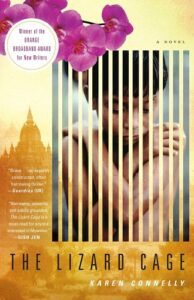
The Lizard Cage by Karen Connelly (Random House, 2008)
This intense yet surprisingly uplifting novel immerses the reader in the realities of life under the military regime in the 1990s. Teza is a singer and songwriter imprisoned at the notorious Insein prison outside Yangon for his anti-government song lyrics. Seven years into a 20-year sentence in solitary confinement, he has begun to lose hope when he meets a neglected orphan whose precarious status as servant inside the prison instills in Teza a new sense of purpose. Vividly imagined and exquisitely written, The Lizard Cage is a testament to the buoyancy of human spirit in times of hardship.
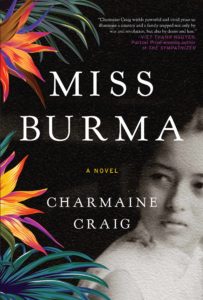
Miss Burma by Charmaine Craig (Grove Press, 2017)
Miss Burma is a fictionalized account of the extraordinary lives of the author’s grandparents and mother respectively coming of age at the tail end of the British Empire and during the tumultuous post-Independence years. Louisa’s mother comes from the Karen people, a proud but persecuted ethnic minority in the southeast of Burma, while her father is a white, Jewish orphan raised in India. As readers, we experience Louisa’s extraordinary transformation from Burma’s national beauty queen to a rebel leader in the Karen people’s struggle for justice and recognition. A beautifully written novel that explores some of the pivotal moments in Myanmar’s history from a less known vantage point, raising important questions of belonging and identity.
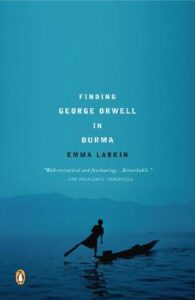
Finding George Orwell in Burma by Emma Larkin (Penguin Press, 2006)
This eye-opening travelogue recounts the author’s attempt in the early 2000s to retrace George Orwell’s footsteps through 1920’s colonial Burma. Posing as a tourist, the Burmese-speaking, American journalist travels across Myanmar seeking to understand Orwell’s transformation from British colonial officer to political satirist. What she encounters is a country besieged by government tyranny, in which military intelligence officers watch her every move and just about anyone could be an informer. And yet the quietly resilient Burmese people nevertheless find myriad ways to both carryon and resist. With her keen observation of detail and shrewd insight, Larkin, who uses a pseudonym for protection, lays bare the ruthless domination of what is indeed an Orwellian regime.
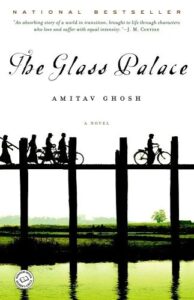
The Glass Palace by Amitav Ghosh (Random House, 2001)
An epic novel of love and loss, this intergenerational novel immerses the reader in Myanmar history—from the British invasion that ousted the last King and Queen, through the shifting alliances of World War II, to the emergence of democracy icon Aung San Suu Kyi in the late 20th and early 21st centuries. Dolly is a young maid in the royal court, Rajkumar, the Indian peasant boy who falls in love with her at first sight. When the King and Queen are ejected from the royal palace on the back of a bullock cart, Dolly follows them to India, while Rajkumar stays behind in Burma, working his way up in the lucrative but punishing teak industry until he can win her hand. The second half of the novel sees Dolly and Rajkumar’s family scattered across Asia and beyond, as the echoes of colonialism and ethno-religious allegiances pit people against each other.
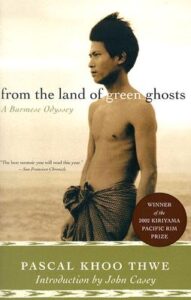
From the Land of Green Ghosts: A Burmese Odyssey by Pascale Khoo Thwe (Harper Collins, 2003)
Born in a remote village in the hills of Shan State, Pascale Khoo Thwe grew up playing soccer and listening to the Beatles while at the same time happily immersed in the rituals of the Padaung people. For university, he makes the arduous journey to Mandalay, only to have his education derailed by political and economic upheaval. When the military government cracks down on student protesters, including the woman he loves, Thwe joins the resistance movement and makes a harrowing escape across the border, and eventually onward to Cambridge University. From the Land of Green Ghosts is a remarkable memoir that illustrates both the diverse ethnic makeup of Myanmar and the extreme conditions endured by freedom fighters in the name of justice.
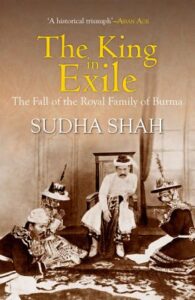
The King in Exile: The Fall of the Royal Family in Burma by Sudha Shah (Harper Collins, 2015)
Queen Supayalat and King Thibaw are the subject of legends—some accurate, others wildly fallacious. Did the queen really steal the king from her sister? Was the king actually a drunk, or was this part of a smear campaign orchestrated by the British? Who issued the order to club all their relatives to death and have them trampled by elephants? In this meticulously researched volume, author Sudha Shah sets out to disentangle fact from fabrication as she traces the story of the royal family from their early days in the Royal Palace of Mandalay, to their 30-year exile in rural India, and back to Rangoon after the King’s death. An easy but fascinating read about an equally fascinating part of Myanmar’s history.
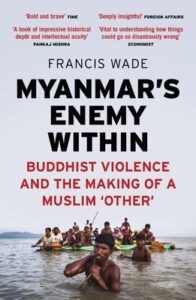
Myanmar’s Enemy Within: Buddhist Violence and the Making of a Muslim ‘Other’ by Francis Wade (Zed Books, 2017)
In this bold reportage, journalist Francis Wade sets out to answer a question that has confounded many: How could a peaceful, Buddhist nation commit mass atrocities against the already disenfranchised Muslim Rohingya minority? Through firsthand interviews with both Buddhists and Muslims, Wade chronicles the rise of Buddhist extremism and shares the personal stories behind the attacks against the Rohingya in 2012, and later 2017, that shocked the world. Myanmar’s Enemy Within explains how the military regime deliberately pitted different ethnicities and religions against each other, manipulating concepts of identity and belonging so that anyone perceived as ‘other’ turned into a threat to be eradicated.
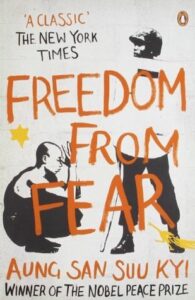
Freedom From Fear and Other Writings by Aung San Suu Kyi (Viking, 1991)
Freedom From Fear is a collection of speeches, letters, interviews and essays about Burmese culture and politics by Aung San Suu Kyi herself. Daughter of revolutionary hero Aung San, she rose to prominence in 1988 when she returned from abroad to visit her ailing mother and was compelled to speak out against the flagrant human rights abuse that she witnessed back home. Fusing personal memoir about her father with commentary about Burmese literature and essays on political ideology, the writings contained in this volume offer both a lens into the extraordinary drive of this controversial woman and a call to action for future activists.
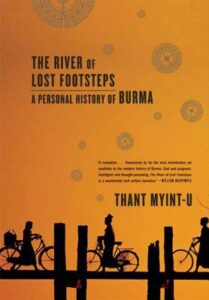
The River of Lost Footsteps by Thant Myint-U (Farrar, Straus, and Groux, 2008)
No list of books about Myanmar is complete without this historical treatise spanning over 2000 years of Burma’s history. Beginning with the ancient dynasties of Pagan, Taungoo, and Konbaung, and continuing through the Anglo-Burmese Wars that precipitated the advent of colonialism into the dark days of military dictatorship in the early 2000s, The River of Lost Footsteps offers the historical and geopolitical context to understand the how and why behind Myanmar’s long, turbulent history. As the grandson of U Thant, former Secretary General of the United Nations, author Thant Myint-U weaves in stories from his own family history to create a more personal account of the forces that shaped the country.
__________________________________
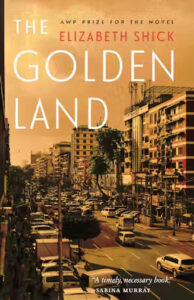
The Golden Land by Elizabeth Shick is available from University of Nebraska Press.

